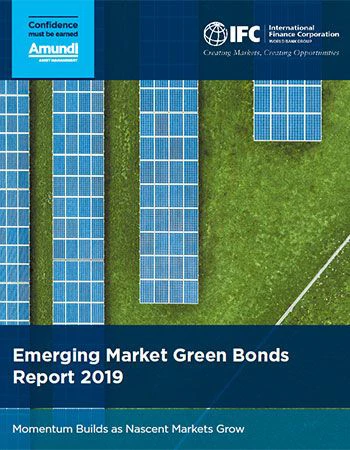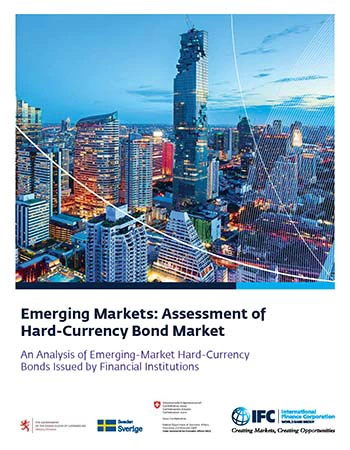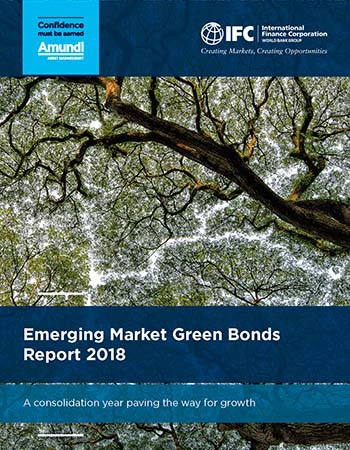IFC's Climate Finance team works with clients to identify climate-friendly investment opportunities and provide business-development support, and customized product training for loan officers. Our advisors build capacity for banks in climate business and facilitate their green transformation, starting from strategic commitments at the board and executive level, down to portfolio diversification and green KPIs at the loan origination units and front-line relationship teams. Our clients often become climate-finance leaders in their local markets.
Our work supports the development of green banking by creating tools to identify, quantify and evaluate climate-friendly product lines including the Climate Assessment for Financial Institutions, green bonds, blue bonds, and sustainability bonds. Our work also looks at the areas of
- Energy: Financing Renewable Energy, Energy Access, Energy Efficiency, and Distributed Energy & Storage Solutions
- Green Buildings: Financing and green mortgages
- Climate Smart Agriculture: Finance and Climate Risks Management
- Commercial Banks: Learning platforms for commercial banks: Green Banking Academy and the Alliance for Green Commercial Banks
- Lending: Credit lines and senior loans (medium to long-term financing), and concessional finance.
- Risk-sharing: Products and partial loan guarantees and trade guarantees.
Additionally, over the past decade, our team has developed and maintained new markets and asset classes to achieve IFC’s climate ambitions and support clients in their own green transitions.
Green Bonds
IFC was one of the earliest issuers of green bonds, launching a Green Bond Program in 2010 to help catalyze the market and unlock investment for private sector projects that support renewable energy and energy efficiency. As of June 30,2020, IFC has issued 172 bonds in 20 currencies, totaling $10.4 billion.
IFC also supports clients in issuing green bonds and in many cases acts as an anchor investor. IFC has helped 19 banks issue $2.4 billion of green bonds between 2015 and 2020. In 2018, IFC launched the world’s largest targeted green bond fund focused on emerging markets, the Amundi Planet Emerging Green One (EGO). The fund, which closed at $1.42 billion, is expected to deploy $2 billion into emerging markets green bonds over its lifetime. Additionally, IFC’s Real Economy Green Investment Opportunity (REGIO) Fund, the first global green bond fund targeting “real economy” issuers in emerging markets, is expected to leverage $500 million to 700 million in multilateral and private sector capital to support well-diversified climate-smart investments in developing countries around the world.
To create and accelerate the growth of green bonds as a new asset class from emerging markets, our team works closely with the Sustainable Banking Network and support its Green Bond Working Group, and other regular impact reports. SBN members receive IFC technical guidance to develop their green bond guidelines based on best international standards and practices. We also manage and administer the Green Bond Technical Assistance Program (GB –TAP), a donor-funded program aiming at accelerating the growth of green bonds in emerging markets.
Market Accelerator for Green Construction
Green Buildings are a $24.7 trillion* investment opportunity in emerging markets. IFC’s Market Accelerator for Green Construction (MAGC) program works with developers and lenders to boost the uptake of energy saving and water saving technologies and practices in the construction markets of developing countries. In partnership with the UK’s BEIS, the program provides firm-level technical assistance, market capacity building, and concessional finance to financial institutions that want to build green building/green housing product lines. Green building projects to be financed under this program need to have EDGE Certification or other compatible certifications.
* Including general construction costs.
Energy Access and Lighting
At the direction of IFC, the off-grid solar sector has grown tremendously over the past 10 years into a vibrant, $1.75 billion annual market, which remains on a solid growth curve. In 2009, the World Bank Group launched Lighting Africa, followed by Lighting Asia, and Lighting Global to rapidly increase access to off-grid solar energy for the 789 million people living without access to energy. With our support, the sector has evolved to include more than 400 companies, includes a global industry association, a standards and quality verification organization, among other industry players. The global off-grid lighting sector currently serves 420 million users and is projected to serve 823 million users by 2030. To sustain the current market growth trajectory, the sector will require an investment of US$ 1.7–2.2 billion in the next five years. Today, the sector continues to expand into markets for appliances and productive uses leveraging solar energy.



